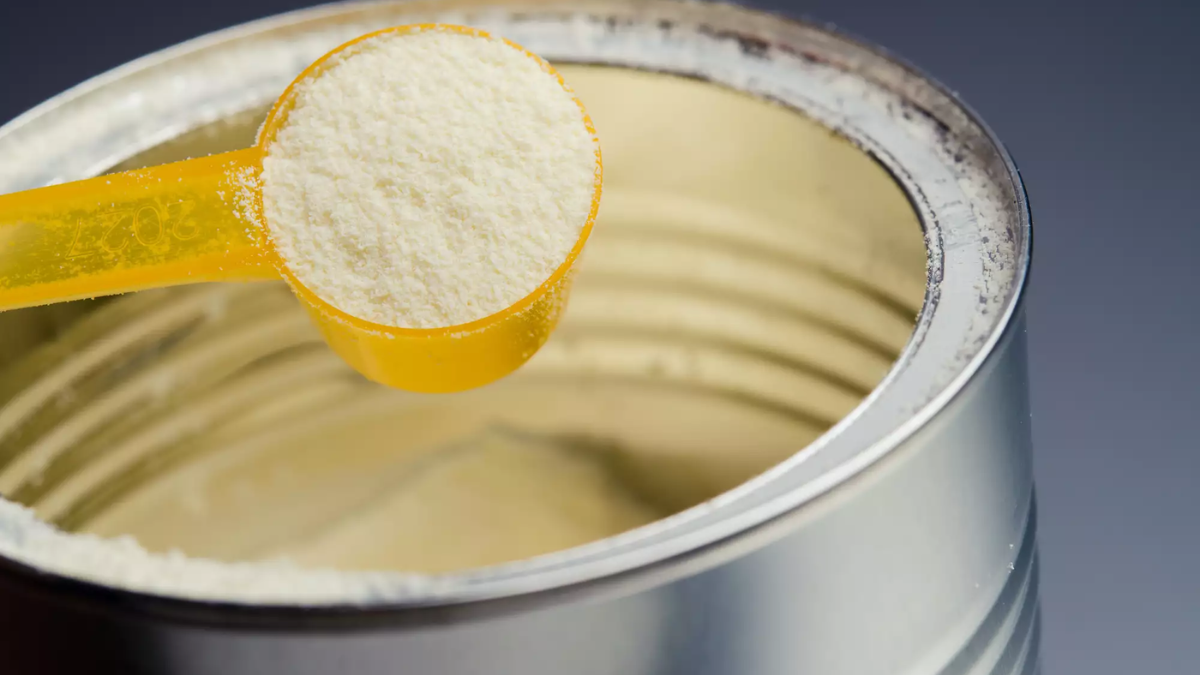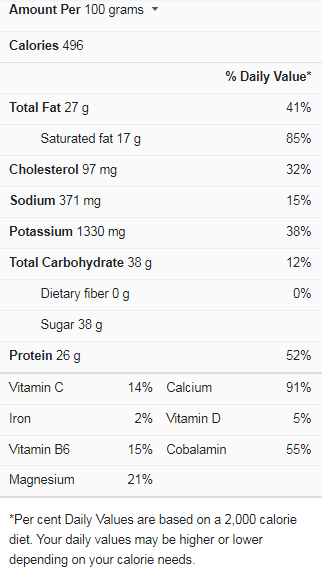Is milk powder a good substitute for whole milk? Here’s all you need to know about milk powder‘s health advantages. A dairy product formed by evaporating ordinary milk is powdered milk. Milk’s limited shelf life makes it handy for folks who can’t get it daily. The cost of transportation is also reduced by reducing it to powder.
This milk will keep a long time if kept in an airtight container, and just a teaspoon can transform your tea, coffee, or shake even though it is largely made of skimmed milk powder. It adds a smoothness to your food and drinks that some people prefer over regular milk.
Milk powder is mostly used in infant formula, but it is also used in the production of candies, chocolates, and Indian mithais such as Gulab Jamun and Cham cham. It is healthier than regular milk, which may include impurities, hence many people prefer it.
Milk powder has the same nutritional profile as milk. Still, it should not be consumed in large quantities because it is heavy in cholesterol and sugar, and improper storage can cause bacteria to grow.
Powdered Milk Nutrition Facts
Powdered Milk’s Health Benefits
Milk powder is made by evaporating milk until only the milk particles remain, which are then condensed and treated at precise temperatures. It is ensured that the nutrients in the raw milk are not lost during the evaporation process. Protein, calcium, potassium, phosphorus, and other vitamins are all found in powdered milk, just as they are in raw milk. Many people keep powdered milk in their bunkers since it lasts longer.
Promotes Cellular Repair and Immune System Regulation
Every cup of milk is high in protein, especially casein and whey protein. These proteins present in milk are considered ‘complete proteins,’ which means they include all of the essential amino acids your body needs to function properly. The amino acids aid in the growth and development of your body, the rapid repair of your cells, and the regulation of immune system processes.
Vitamins A, D, E, and K are also found in milk. Vitamin A in milk aids cell growth and differentiation, Vitamin E aids in immune system regulation by boosting the body’s reaction to illnesses, and Vitamin K aids in blood clotting. These milk powders can come in various formats, including organic milk powder, which is a better option.
This Supplement Aids Muscle Growth
Whey protein, one of the high-quality proteins found in milk, contains branched-chain amino acids, which aid in muscle growth and provide sufficient energy during exercise. This reduces the likelihood of muscle wasting (or atrophy) due to a lack of physical activity and age-related muscle loss. Milk is a suggested supplement for athletes, individuals who lead an active lifestyle, and the elderly because of its health benefits.
Milk can help athletes and physically active adults by promoting muscle healing and reducing muscular discomfort and injury. It can also be a substitute for those who drink protein drinks before and after their workouts. Alternatively, add it to your protein powder pancakes as an ingredient. Increased muscle mass and improved physical movement, on the other hand, can help older persons.
Fracture and Other Bone-Related Risks are Reduced
It’s no coincidence that milk has long been connected with stronger, healthier bones. The calcium in milk meets the daily calcium requirements in appropriate proportions. In combination with the other minerals contained in milk phosphorus, potassium, and protein, calcium is essential for strong and healthy bones.
As a result, adding milk to your daily diet can help you avoid bone-related problems like fractures, osteoporosis, and bone loss, especially as your bones age. Although there is presently no cure for osteoarthritis, it has been discovered that drinking milk regularly is connected to a slower advancement of the illness.
Aids in the Maintenance of a Healthy Heart
Milk is high in potassium, which helps lower blood pressure, and milk consumption with a controlled potassium intake can lower the risk of cardiovascular disease. When paired with exercise, the high-quality protein present in milk contributes to weight maintenance and loss by helping to maintain a healthy amount of muscle or lean muscle mass.
Lactose Intolerant Individuals Can Get Healthy Milk
Lactose intolerance affects some people who have special dietary demands and cannot digest milk. Some people avoid drinking milk for health reasons, dietary limitations, or personal preferences. The good news is that low lactose powdered milk formulas and non-dairy milk substitutes are now available to meet their nutritional demands while still giving the same health advantages.
Is it Possible to Consume Powder Milk Daily?
This may result in nutritional deficiency and jeopardize the nutritional value of milk in powder form. Milk powder is not something I would advocate for long-term consumption as a dietitian. “It can’t be used as a stand-alone meal replacement milk powder contains oxidized cholesterol, which is difficult for the body to digest. Cholesterol adverse effects include weight gain, high blood pressure, and cardiac problems. Milk powder is generally harmless if ingested in small amounts.
Powdered milk (also known as dried milk) should be used within 18 months of purchase. However, this is merely a best-by date. Powdered milk, according to the USDA, can be stored indefinitely. 1 After the printed ” date, an unopened item is likely viable for another 2 to 10 years. Powdered milk has the same nutritional value as fresh milk and is less perishable, and it can boost the protein level and nutritional value of recipes. Oxidized cholesterol, which can damage blood vessels and exacerbate heart disease, is likely found in whole milk powder.
Is Milk Powder Healthier than Milk?
When compared to powdered milk, fresh milk has a higher nutritional content. B-5 and B-12 vitamins are more abundant in fresh or normal milk and these vitamins aid in the maintenance of your nervous system’s health. In comparison to powdered milk, fresh milk has more selenium and phosphorus. Regular milk can be replaced with powdered milk or dry milk. It can be stored at room temperature and has a long shelf life, and it doesn’t need to be refrigerated because of its low moisture content.
It’s also incredibly easy to use and doesn’t detract from the dish’s flavor. This question has a clear answer: NO. Milk will not make you gain weight; it will help you shed weight. Milk is nutritious and a good source of high-quality protein, essential for muscle growth and development. Skimmed Milk Powder is one of the most beneficial dairy products for maintaining excellent health. It is a low-fat, nonfat milk powder that helps to keep the body’s calorie intake in check. As a result, it is an excellent product for people trying to lose weight.
Is There a Lot of Sugar in Powdered Milk?
Low-fat milk has 12.7g of carbohydrates, whereas whole-fat milk has 12g of carbohydrates, all of which are lactose. Lactose is a sugar found only in milk and milk products, and it’s a disaccharide, which means it’s made up of two sugar molecules: glucose and galactose. Nestle every day is a popular dairy whitener in India, where it’s used to make tea, coffee, and milk. We were shocked by the high sugar content, as a 100 gm pack includes 38 grams of sugar, and because people tend to add extra sugar when making tea/coffee, this could lead to a sugar overload.
Fresh milk offers a better flavor and taste than powdered milk and has more bioactive components. In comparison to powdered milk, fresh milk includes higher B5 and B12 vitamins, phosphorus, and selenium, which aid nervous system health and have a role in enzyme activity. Yes, keto-friendly whole milk powder with no extra additives. A spoonful of milk powder contains three carbohydrates. This recipe calls for 1 cup of whole milk powder, 48 calories, and 48 carbohydrates.
Is Powdered Milk the Same as Genuine Milk?
Fresh milk is liquidized, whereas powdered milk is prepared from dehydrated, pasteurized milk. It is available in various forms, including nonfat and dry milk. It’s a dairy product prepared by evaporating milk until it’s completely dry, which helps preserve it. Powdered milk can replace fresh milk in cooking and baking if you follow these simple substitution rules. The most popular powdered milk substitutes are milk products.
One cup fresh milk plus 1/3 cup powdered milk can be substituted with 1 cup water plus 1/3 cup powdered milk when fresh milk is required. Milk powder has the same nutritional profile as milk. Still, it is not recommended for frequent consumption because it is heavy in cholesterol and sugar, and it can also grow bacteria owing to improper storage. Fresh milk has the same nutritional value as powdered milk. Protein, calcium, vitamin D, and vitamin A are bone-building nutrients. Protein-rich powdered milk can improve recipe protein and energy (especially for people with health conditions that need extra protein).
Is Powdered Milk Suitable for Use in Coffee?
If you don’t consume much milk normally, powdered milk with coffee is a wonderful alternative for your health. Powdered milk lasts longer than milk, is easier to portion, and is a healthier alternative to most creamers. The barista’s best friend is whole milk. With around 4% fat, this type of dairy may be less “healthy” for individuals on a low-fat diet, but it does provide a richness of texture to the palate that many people love. To make up for nutrients lost during dehydration, milk powder contains the same nutrients as fresh milk.
On the other hand, coffee creamer necessitates a great deal of processing and components. Allow the milk powder mixture to boil in the boiling water. 2 tsp instant coffee powder, 2 tsp boiled water, 2 tsp instant coffee powder, 2 tsp boiled water, 2 tsp instant coffee powder, 2 tsp boiled water, 2 tsp boiled water, In a serving glass, combine the coffee decoction, sugar, and boiling milk powder. Stir well until smooth and frothy. Then serve with whatever fritters you choose.
Conclusion
Powdered milk provides a variety of essential nutrients, vitamins, and minerals to the body. You can meet some of your body’s basic nutritional needs by diluting milk powder in simple water or mixing it with other natural food products. Powdered milk products are made and processed regularly to keep them as natural as possible. Powder milk has a bright future as a result of its benefits. Continue reading to find out if milk powder is a good substitute for actual milk.




